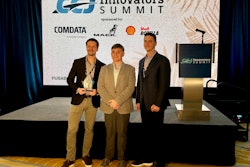President Paul Williams has noticed more employees using the company’s fitness room since he started using it early this year.
Paul Williams doesn’t take good health for granted. In a short period of time, cancer claimed the life of his father, who previously ran Wooster, Ohio-based Wooster Motor Ways, and the company’s vice president of operations, who had worked with Williams’ father for many years. The personal loss was enough to motivate Williams, now WMW’s president, to worry about employee health. But there also were significant financial considerations. WMW self-insures for the bulk of its employee heath care coverage.
The Williams family’s first step was to add a new opportunity to WMW’s health coverage – a free annual physical, up to $300, for each WMW employee and spouse who wants one. Costs above $300 are covered by an 80/20 co-pay. It’s a sizable financial commitment, but Williams doesn’t doubt the wisdom for a second. “We believe that’s an investment. If you detect one instance of cancer, it pays back.”
The free physical has uncovered several instances of cholesterol, blood pressure and blood sugar problems that might have gone undetected until they developed into more serious conditions, says Don Cherry, WMW’s director of safety. But following these successes, Williams, Cherry and others at WMW came to recognize that detection was only the beginning. WMW management began to see a deeper mission: helping employees cope with and even avoid those early stages of health problems. On the foundation of company-wide physicals, WMW recently began what today is a full-fledged wellness program.
One champion of the wellness initiative was Ron “Doc” Ramage, WMW’s driver services and safety compliance manager. A former driver, Ramage functions much like a driver advocate within management, helping the carrier communicate more effectively with drivers, provide a better work environment and encourage drivers to operate more safely.
WMW created Ramage’s position in 2001 as part of a reorganization aimed at improved driver retention and satisfaction. At the same time, the carrier converted to a driver manager system from old-style geographical dispatch. The driver manager system allowed for closer management of and consistent treatment of drivers for the mutual benefit of drivers and WMW, says Scott Spitler, WMW’s director of operations.
“Doc felt we could take [the wellness program] a little further,” Williams says. Like Williams, Ramage had a personal motive. He was a cancer survivor, having had prostate cancer detected in the early stages.
What the WMW managers wanted was a program that addressed the problems that can arise from the trucker lifestyle – long hours spent sitting and eating on the road. “A sedentary lifestyle will lead to health issues,” Cherry says. Out of that concern grew the idea for meetings one Saturday each month during the winter at the local Wooster Community Hospital, beginning in November 2002. The meetings, which are open to employees and spouses, are held only in the winter, Williams says, because there are too many competing activities at other times during the year. During the first year, attendance averaged 45 employees.
At each meeting, held in the hospital’s auditorium, a dietician covered various topics, such as which foods are especially healthy, how food should be prepared and how they can be packaged for drivers to take on the road. At each meeting, participants are served healthy snacks.
The monthly meetings also have covered the importance of exercise, including workouts that could be done while sitting or while at a truck stop or in a hotel room. At one meeting, hospital personnel drew blood to check cholesterol levels. One employee was found to be borderline diabetic and was able to be treated without insulin, which would have disqualified him from driving.
At another meeting, a hypnotist associated with the American Lung Association tried to help employees quit smoking. The company and employees shared the cost of that particular program, although the company offered employees their money back if they quit smoking for at least six months.
The pro-health mindset has spread throughout WMW. In the offices, traditional vending machines are gone, along with their snacks and sodas chocked full of sugar, fat and sodium. In their place, the company installed machines that dispense soups, salads and juices.
The latest product of the wellness campaign is a fitness facility, available 24/7 to any WMW employee. When the idea first came up, WMW managers started looking for potential spaces to sacrifice to a workout room. But WMW’s maintenance director offered up a more cost-effective solution. At a cost of about $18,000 the company converted an old, unused 48-foot trailer, installing cardiovascular equipment, weight-training machines and free weights, as well as lighting, heat, air conditioning, carpeting and a television with cable.
WMW opened the fitness trailer in August last year, and as of March, the company had handed out more than 60 keys. Williams himself began using the fitness facility early this year. “Since I started using it, I have noted a big increase in others working out,” he says. Additional wellness activities in the works include walking groups and exercise and weight loss challenges.
Williams concedes that the payback for WMW’s wellness programs is hard to quantify, but he is certain that the company is helping employees change habits and address problems that would otherwise lead to serious illness – and big hospital bills.
Turnover has dropped from 44 percent in 2001 to 26 percent by the end of last year, although the company doesn’t claim the wellness program is responsible. Williams and his team attribute that success mostly to switching to a driver manager system, establishing Ramage’s position and various other efforts, including driver appreciation events three times a year at which drivers can raise any concern – without their driver managers present.
Williams also thinks that greater care in hiring has helped with retention. The company last year, for example, began using a screening test developed by an industrial psychologist to assess applicants’ communications skills, time management, ability to read maps, honesty and math skills. By the end of the year, the company had rejected 26 applicants based on the screen who otherwise would have been hired. “We’re not bringing guys on that we aren’t likely to keep,” Williams says.
Still, Williams believes the wellness initiative plays a role in reducing turnover. As he says, you can’t retain a driver who doesn’t remain alive and healthy.






